高中英语语法虚拟语气讲解
- 格式:doc
- 大小:26.50 KB
- 文档页数:2

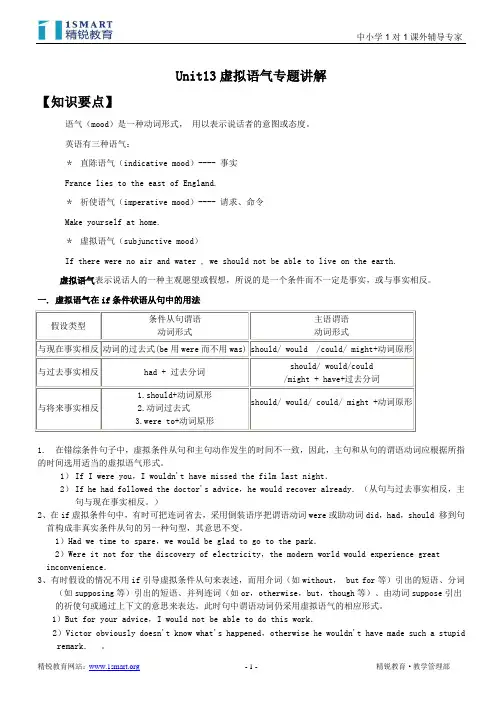
Unit13虚拟语气专题讲解【知识要点】语气(mood)是一种动词形式,用以表示说话者的意图或态度。
英语有三种语气:*直陈语气(indicative mood)---- 事实France lies to the east of England.*祈使语气(imperative mood)---- 请求、命令Make yourself at home.*虚拟语气(subjunctive mood)If there were no air and water , we should not be able to live on the earth.虚拟语气表示说话人的一种主观愿望或假想,所说的是一个条件而不一定是事实,或与事实相反。
一. 虚拟语气在if条件状语从句中的用法假设类型条件从句谓语动词形式主语谓语动词形式与现在事实相反动词的过去式(be用were而不用was) should/ would /could/ might+动词原形与过去事实相反had + 过去分词should/ would/could /might + have+过去分词与将来事实相反1.should+动词原形2.动词过去式3.were to+动词原形should/ would/ could/ might +动词原形1. 在错综条件句子中,虚拟条件从句和主句动作发生的时间不一致,因此,主句和从句的谓语动词应根据所指的时间选用适当的虚拟语气形式。
1)If I were you,I wouldn't have missed the film last night.2)If he had followed the doctor's advice,he would recover already.(从句与过去事实相反,主句与现在事实相反。
)2、在if虚拟条件句中,有时可把连词省去,采用倒装语序把谓语动词were或助动词did,had,should 移到句首构成非真实条件从句的另一种句型,其意思不变。
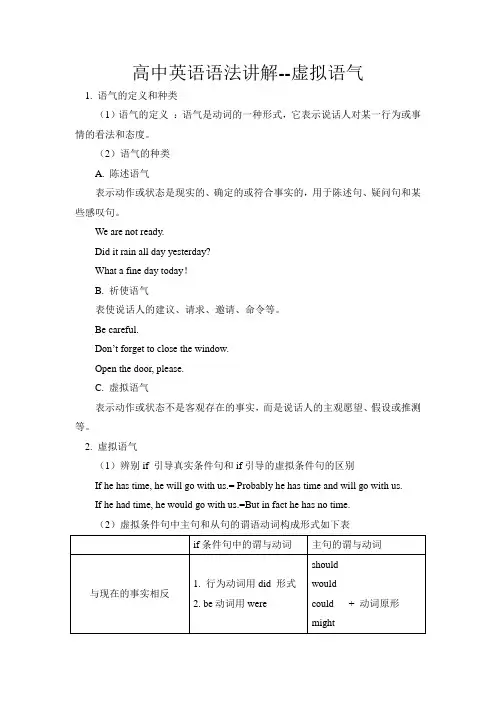
高中英语语法讲解--虚拟语气1. 语气的定义和种类(1)语气的定义:语气是动词的一种形式,它表示说话人对某一行为或事情的看法和态度。
(2)语气的种类A. 陈述语气表示动作或状态是现实的、确定的或符合事实的,用于陈述句、疑问句和某些感叹句。
We are not ready.Did it rain all day yesterday?What a fine day today!B. 祈使语气表使说话人的建议、请求、邀请、命令等。
Be careful.Don’t forget to cl ose the window.Open the door, please.C. 虚拟语气表示动作或状态不是客观存在的事实,而是说话人的主观愿望、假设或推测等。
2. 虚拟语气(1)辨别if 引导真实条件句和if引导的虚拟条件句的区别If he has time, he will go with us.= Probably he has time and will go with us.If he had time, he would go with us.=But in fact he has no time.(2)虚拟条件句中主句和从句的谓语动词构成形式如下表if条件句中的谓与动词主句的谓与动词与现在的事实相反1. 行为动词用did 形式2. be动词用wereshouldwouldcould + 动词原形might与过去的事实相反had + doneshouldwouldcould + have + donemight与将来的事实相反1. 行为动词用did2. should + 动词原形3. were to + 动词原形shouldwouldcould + 动词原形might(3)混合时间的虚拟语气如果条件句中的动作和主句的动作不是同时发生,主句和从句的谓语动词的形式应分别根据各自所表示的时间加以调整。
1. If I had received the passport yesterday, I would start today.2. If he had telephoned me last night, I would see him now.3. If he had followed the doctor’s advice, he would be all right now.4. If China had not been liberated, the working people would still be leading a miserable life.5. If he had listened to me, he ______ be in such trouble now.A. haven’tB. would notC. had notD. would haven’t(4)虚拟语气中的倒装句如果虚拟语气的条件从句谓语动词中含有were, had, could, should,有时可将if省去,而将条件从句的主语置于were, had, should, could 之后。
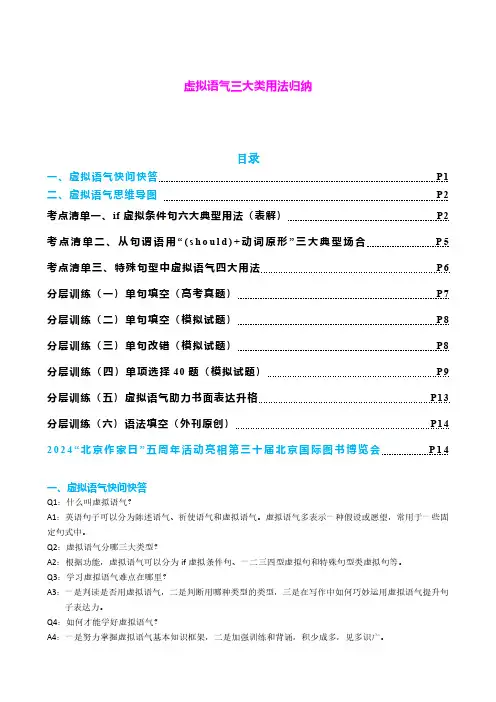
虚拟语气三大类用法归纳目录一、虚拟语气快问快答P1二、虚拟语气思维导图P2考点清单一、if虚拟条件句六大典型用法(表解)P2考点清单二、从句谓语用“(s h o u l d)+动词原形”三大典型场合P5考点清单三、特殊句型中虚拟语气四大用法P6分层训练(一)单句填空(高考真题)P7分层训练(二)单句填空(模拟试题)P8分层训练(三)单句改错(模拟试题)P8分层训练(四)单项选择40题(模拟试题)P9分层训练(五)虚拟语气助力书面表达升格P13分层训练(六)语法填空(外刊原创)P14 2024“北京作家日”五周年活动亮相第三十届北京国际图书博览会P14一、虚拟语气快问快答Q1:什么叫虚拟语气?A1:英语句子可以分为陈述语气、祈使语气和虚拟语气。
虚拟语气多表示一种假设或愿望,常用于一些固定句式中。
Q2:虚拟语气分哪三大类型?A2:根据功能,虚拟语气可以分为if虚拟条件句、一二三四型虚拟句和特殊句型类虚拟句等。
Q3:学习虚拟语气难点在哪里?A3:一是判读是否用虚拟语气,二是判断用哪种类型的类型,三是在写作中如何巧妙运用虚拟语气提升句子表达力。
Q4:如何才能学好虚拟语气?A4:一是努力掌握虚拟语气基本知识框架,二是加强训练和背诵,积少成多,见多识广。
二、虚拟语气思维导图考点清单一、if 虚拟条件句六大典型用法场合从句谓语主句谓语与现在事实相反动词过去式(be 用were)would+动词原形If I had time,I would go for a walk.(事实上我现在没有时间,不能去散步.)If I were invited,I would go to the dinner.(事实上没有人邀请我,我也不能去参加宴会.)与过去事实相反had +动词过去分词would have doneIf she had seen you yesterday,she would have askedyou about it.要是她昨天看到你,她就要向你问起这件事。
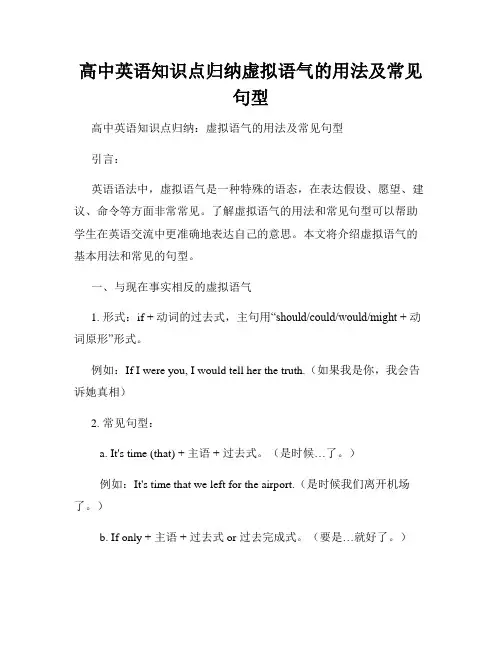
高中英语知识点归纳虚拟语气的用法及常见句型高中英语知识点归纳:虚拟语气的用法及常见句型引言:英语语法中,虚拟语气是一种特殊的语态,在表达假设、愿望、建议、命令等方面非常常见。
了解虚拟语气的用法和常见句型可以帮助学生在英语交流中更准确地表达自己的意思。
本文将介绍虚拟语气的基本用法和常见的句型。
一、与现在事实相反的虚拟语气1. 形式:if + 动词的过去式,主句用“should/could/would/might + 动词原形”形式。
例如:If I were you, I would tell her the truth.(如果我是你,我会告诉她真相)2. 常见句型:a. It's time (that) + 主语 + 过去式。
(是时候…了。
)例如:It's time that we left for the airport.(是时候我们离开机场了。
)b. If only + 主语 + 过去式 or 过去完成式。
(要是…就好了。
)例如:If only he had listened to my advice!(要是他听了我的建议就好了!)c. I wish/If only + 主语 + 过去式 or 过去完成式。
(我希望…)例如:I wish I had more time to study.(我希望我有更多时间学习。
)二、与过去事实相反的虚拟语气1. 形式:if + 主语 + had + 过去分词,主句用“should/might + have + 过去分词”形式。
例如:If he had known about the party, he would have come.(如果他知道派对的话,他就会来的。
)2. 常见句型:a. If it had not been for + 名词,主语 + would/could/might not have + 过去分词.(如果不是因为…)例如:If it had not been for your help, I would not have passed the exam.(如果不是因为你的帮助,我不会通过考试的。
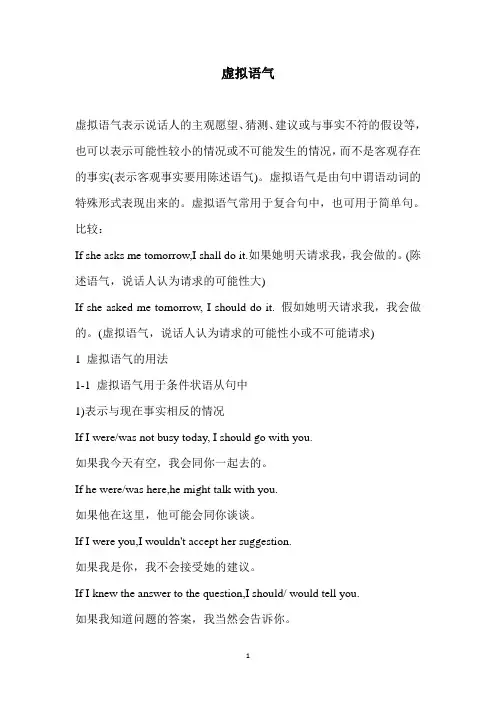
虚拟语气虚拟语气表示说话人的主观愿望、猜测、建议或与事实不符的假设等,也可以表示可能性较小的情况或不可能发生的情况,而不是客观存在的事实(表示客观事实要用陈述语气)。
虚拟语气是由句中谓语动词的特殊形式表现出来的。
虚拟语气常用于复合句中,也可用于简单句。
比较:If she asks me tomorrow,I shall do it.如果她明天请求我,我会做的。
(陈述语气,说话人认为请求的可能性大)If she asked me tomorrow, I should do it. 假如她明天请求我,我会做的。
(虚拟语气,说话人认为请求的可能性小或不可能请求)1 虚拟语气的用法1-1 虚拟语气用于条件状语从句中1)表示与现在事实相反的情况If I were/was not busy today, I should go with you.如果我今天有空,我会同你一起去的。
If he were/was here,he might talk with you.如果他在这里,他可能会同你谈谈。
If I were you,I wouldn't accept her suggestion.如果我是你,我不会接受她的建议。
If I knew the answer to the question,I should/ would tell you.如果我知道问题的答案,我当然会告诉你。
If we left now, we should/would arrive there in time.如果我们现在就动身,我们会准时到达那里。
If he didn't do exercise every day,he wouldn't be so strong.如果他不每天锻炼,他不会那样强壮的。
If it weren't raining, we would go fishing.要是现在不下雨,我们就去钓鱼了。
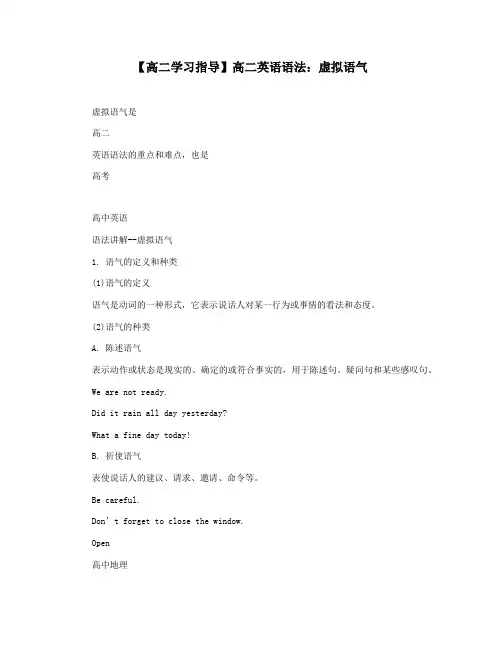
【高二学习指导】高二英语语法:虚拟语气
虚拟语气是
高二
英语语法的重点和难点,也是
高考
高中英语
语法讲解--虚拟语气
1. 语气的定义和种类
(1)语气的定义
语气是动词的一种形式,它表示说话人对某一行为或事情的看法和态度。
(2)语气的种类
A. 陈述语气
表示动作或状态是现实的、确定的或符合事实的,用于陈述句、疑问句和某些感叹句。
We are not ready.
Did it rain all day yesterday?
What a fine day today!
B. 祈使语气
表使说话人的建议、请求、邀请、命令等。
Be careful.
Don’t forget to close the window.
Open
高中地理
the door, please.
C. 虚拟语气
表使动作或状态不是客观存在的事实,而是说话人的主观愿望、假设或推测等。
2. 虚拟语气
(1)辨别if 引导真实条件句和if引导的虚拟条件句的区别
If he has time, he will go with us.= Probably he has time and will go with us.
If he had time, he would go with us.=But in fact he has no time.
(2)虚拟条件句中主句和从句的谓与动词构成形式如下表
只要大家认真看了上面的高二英语语法:虚拟语气知识,在辅助相关的练习,我相信大家一定能弄懂虚拟语气。
感谢您的阅读,祝您生活愉快。
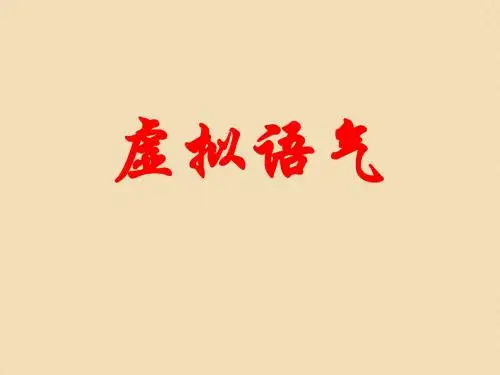
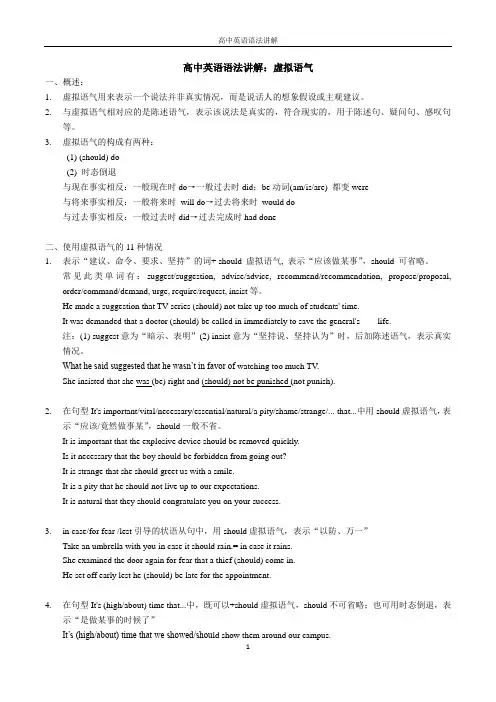
高中英语语法讲解:虚拟语气一、概述:1.虚拟语气用来表示一个说法并非真实情况,而是说话人的想象假设或主观建议。
2.与虚拟语气相对应的是陈述语气,表示该说法是真实的,符合现实的,用于陈述句、疑问句、感叹句等。
3.虚拟语气的构成有两种:(1) (should) do(2) 时态倒退与现在事实相反:一般现在时do→一般过去时did;be动词(am/is/are) 都变were与将来事实相反:一般将来时will do→过去将来时would do与过去事实相反:一般过去时did→过去完成时had done二、使用虚拟语气的11种情况1.表示“建议、命令、要求、坚持”的词+ should 虚拟语气, 表示“应该做某事”,should 可省略。
常见此类单词有:suggest/suggestion, advise/advice, recommend/recommendation, propose/proposal, order/command/demand, urge, require/request, insist等。
He made a suggestion that TV series (should) not take up too much of students' time.It was demanded that a doctor (should) be called in immediately to save the general's life.注:(1) suggest意为“暗示、表明”(2) insist意为“坚持说、坚持认为”时,后加陈述语气,表示真实情况。
What he said suggested that he wasn’t in favor of watching too much TV.She insisted that she was (be) right and (should) not be punished (not punish).2.在句型It's important/vital/necessary/essential/natural/a pity/shame/strange/... that...中用should虚拟语气,表示“应该/竟然做事某”,should一般不省。
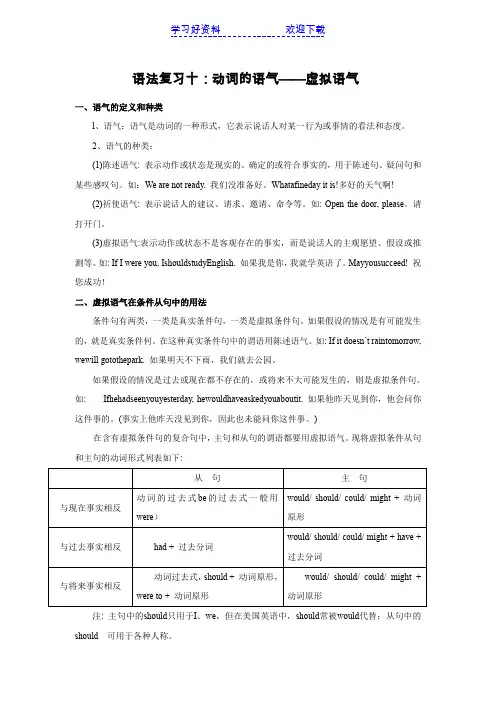
学习好资料 欢迎下载 语法复习十:动词的语气——虚拟语气 一、语气的定义和种类 l、语气:语气是动词的一种形式,它表示说话人对某一行为或事情的看法和态度。 2、语气的种类: (1)陈述语气: 表示动作或状态是现实的、确定的或符合事实的,用于陈述句、疑问句和某些感叹句。如:We are not ready. 我们没准备好。Whatafineday it is!多好的天气啊! (2)祈使语气: 表示说话人的建议、请求、邀请、命令等。如: Open the door, please。请打开门。 (3)虚拟语气:表示动作或状态不是客观存在的事实,而是说话人的主观愿望、假设或推测等。如: If I were you, IshouldstudyEnglish. 如果我是你,我就学英语了。Mayyousucceed! 祝您成功! 二、虚拟语气在条件从句中的用法 条件句有两类,一类是真实条件句,一类是虚拟条件句。如果假设的情况是有可能发生的,就是真实条件何。在这种真实条件句中的谓语用陈述语气。如: If it doesn’t raintomorrow, wewill gotothepark. 如果明天不下雨,我们就去公园。 如果假设的情况是过去或现在都不存在的,或将来不大可能发生的,则是虚拟条件句。如: Ifhehadseenyouyesterday, hewouldhaveaskedyouaboutit. 如果他昨天见到你,他会问你这件事的。(事实上他昨天没见到你,因此也未能问你这件事。) 在含有虚拟条件句的复合句中,主句和从句的谓语都要用虚拟语气。现将虚拟条件从句和主句的动词形式列表如下: 从 句 主 句
与现在事实相反 动词的过去式be的过去式一般用were) would/ should/ could/ might + 动词原形
与过去事实相反 had + 过去分词 would/ should/ could/ might + have + 过去分词
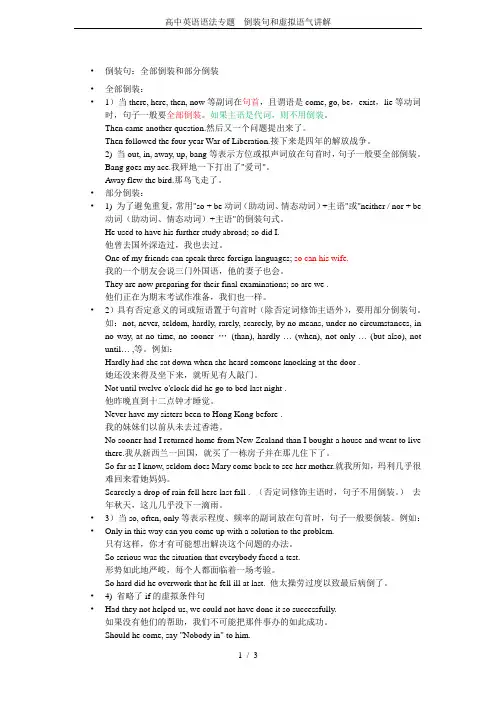
•倒装句:全部倒装和部分倒装•全部倒装:•1)当there, here, then, now等副词在句首,且谓语是come, go, be,exist,lie等动词时,句子一般要全部倒装。
如果主语是代词,则不用倒装。
Then came another question.然后又一个问题提出来了。
Then followed the four-year War of Liberation.接下来是四年的解放战争。
2) 当out, in, away, up, bang等表示方位或拟声词放在句首时,句子一般要全部倒装。
Bang goes my ace.我砰地一下打出了"爱司"。
Away flew the bird.那鸟飞走了。
•部分倒装:•1) 为了避免重复,常用"so + be动词(助动词、情态动词)+主语"或"neither / nor + be 动词(助动词、情态动词)+主语"的倒装句式。
He used to have his further study abroad; so did I.他曾去国外深造过,我也去过。
One of my friends can speak three foreign languages; so can his wife.我的一个朋友会说三门外国语,他的妻子也会。
They are now preparing for their final examinations; so are we .他们正在为期末考试作准备,我们也一样。
•2)具有否定意义的词或短语置于句首时(除否定词修饰主语外),要用部分倒装句。
如:not, never, seldom, hardly, rarely, scarcely, by no means, under no circumstances, in no way, at no time, no sooner …(than), hardly … (when), not only … (but also), not until… ,等。
语法讲解:虚拟语气一、语气的定义和种类l. 语气:语气是动词的一种形式,它表示说话人对某一行为或事情的看法和态度。
2. 语气的种类(1)陈述语气:表示动作或状态是现实的、确定的或符合事实的,用于陈述句、疑问句和某些感叹句。
如:We are not ready. 我们没准备好。
What a fine day it is!多好的天气啊!(2)祈使语气:表示说话人的建议、请求、邀请、命令等。
如:Open the door,please.请打开门。
(3)虚拟语气:表示动作或状态不是客观存在的事实,而是说话人的主观愿望、假设或推测等。
如: If I were you, I should study English. 如果我是你,我就学英语了。
May you succeed!祝您成功!二、虚拟语气在条件从句中的用法条件句有两类,一类是真实条件句,一类是虚拟条件句。
如果假设的情况是有可能发生的,就是真实条件句。
在这种真实条件句中的谓语用陈述语气。
如: If it doesn't rain tomorrow, we will go to the park. 如果明天不下雨,我们就去公园。
如果假设的情况是过去或现在都不存在的,或将来不大可能发生的,则是虚拟条件句。
如: If he had seen you yesterday, he would have asked you about it. 如果他昨天见到你,他会问你这件事的。
(事实上他昨天没见到你,因此也未能问你这件事。
)在含有虚拟条件句的复合句中,主句和从句的谓语都要用虚拟语气。
现将虚拟条件从句和主句的动词形式列表如下:从句主句与现在事实相反动词的过去式(be的过去式一般用were)would/ should/ could/ might + 动词原形与过去事实相反had + 过去分词 would/ should/ could/ might + have + 过去分词与将来事实相反动词过去式,should + 动词原形,were to + 动词原形would/ should/ could/ might + 动词原形注:主句中的should只用于I、we,但在美国英语中,should常被would代替;从句中的should可用于各种人称。
【高中英语】高中英语语法讲解:虚拟语气if倒装句省略连词if采用倒装的非真实条件句在书面语中,条件从句可以将过去时态were、had或should移到主语之前的谓语中,如果没有连词,就可以形成倒装句。
例:wereyouinmyposition,youwoulddothesame.如果你处在我的位置,你也会这么做。
要是他早点来的话,他就会见到她了。
虚拟语气在条件句中的应用非真实条件句中的条件从句有时不表示出来,只暗含在短语或上下文中,这种句子叫做储蓄条件句。
常见的有but,for,without等引导的短语,以及or,orelse,otherwise,but等后面的分句。
要不是你的帮助,我们不可能完成这个实验如果没有你的帮助,我们的实验室是不会成功的。
在更多可用条件下,我们本可以保存一个更好的在更有利的条件下,我们能够做得更好些。
经典测试地点:1、____rightnow,shewouldgetthereonsunday.a)她会离开吗b)ifsheleavesc) wereshetoleaved)ifshehadleft2、 ____________________________。
a)notbeingb)不是吗c)withoutbeingd)什么都没有3、wedidn’tknowhistelephonenumber,otherwisewe____him.a)我会打电话吗b)musthavetelephonedc)你会打电话吗d)hadtelephoned4、作为一种对目标的潜在的安全分析,不幸的是,它从来都不是。
a)wouldidentifyb)威利迪c)wouldhaveidentifiedd) willhaveidentified解析:1.答案是C。
从句子结构来看,这个问题是一个虚拟语气,与未来事实相反。
主句的谓语是“应该+动词原型”。
同时,该从句省略了连词if,它可以提前形成倒装句。
只有C符合语法规则。
虚拟语气
知识导图
虚拟语气的定义:虚拟语气表示说话人的某种愿望、假设、怀疑、猜测和建议等,表示的是纯属假设或实现的可能性不大的情况。
虚拟语气是由句中的谓语的特殊形式表现出来的。
虚拟语气的用法
1.虚拟语气用于条件句(条件状语从句)
①条件句的分类
条件句可以分为两种:真实条件句和虚拟条件句。
真实条件句是一种可能实现的条件句,且实现的可能性非常大。
在条件句中常用表示现在的某种时态代替表示将来的时态。
If I have time, I’ll come over to see you.
虚拟条件句是一种表示不能实现或实现的可能性很小的条件句。
其谓语动词用虚拟语气。
If I had time, I should/would/could come over to see you.
②用法。
虚拟语气一.语气的定义和种类1. 语气的定义语气是动词的一种形式,它表示说话人对某一行为或事情的看法和态度。
2. 语气的种类A. 陈述语气表示动作或状态是现实的、确定的或符合事实的,用于陈述句、疑问句和感叹句。
We are not ready.Did it rain all day yesterday?What a fine day today!B. 祈使语气表示说话人的建议、请求、邀请、命令等。
Open the door, please.Don’t forget to close the window.C. 虚拟语气表使动作或状态不是客观存在的事实,而是说话人的主观愿望、假设或推测等。
二.虚拟语气1. 条件句中的虚拟语气if 引导真实条件句和if引导的虚拟条件句的区别If he has time, he will go with us. (Probably he has time and will go with us.)If he had time, he would go with us. (But in fact he has no time.)★★★虚拟条件句中主句和从句的谓语动词构成形式如下表if条件句中的谓语动词主句的谓语动词与现在事实相反过去式(did/ be动词用were) would/could/might/should+do(动词原形)与过去事实相反过去完成时(had + done)would/could/might/should+have done(过去分词)与将来事实相反1. 过去式(did/ be动词用were)2. should +do (动词原形)3. were to +do (动词原形)would/could/might/should+do(动词原形)①If he had time now, he would go with you.( 与______事实相反)②If he were not busy now, he would go with you. ( 与______事实相反)③If you had come a few minutes earlier, you would have met the famous singer.(与______事实相反)④If it were to snow/should snow/ snowed this evening, they would not go out.(与______事实相反)练习:与现在事实相反的句子①If you_______ here, you__________ the famous star.如果你在这里,你就会见到这位明星。
高中英语语法虚拟语气详解虚拟语气,又称假设语气,是谓语动词的一种形式,表示说话人叙述的内容与事实相反,在现实中并不存在,或实现的可能性很小。
一、动词的语气语气可以用来区别讲话人对某一行为或事情的看法和态度。
英语中的语气有三种,分别是陈述语气、祈使语气和虚拟语气。
(一)陈述语气陈述语气一般用来叙述事实或就事实提出询问,主要用于陈述句、疑问句和某些感叹句。
Where there is a will, there's a way.有志者事竟成。
Can you help me carry the box upstairs.你能帮我把箱子搬到楼上吗?How I missed the life in the countryside!我多么想念乡村的生活啊!(二)祈使语气祈使语气表示说话人向对方提出请求或下达命令。
Come this way, please!请这边走。
Don't make any noise, will you?别吵,行吗?Do be careful when crossing the street.过马路时一定要小心。
(三)虚拟语气的事实,而是说话人的主观愿望、假设或推测等。
If I were a bird, I could fly in the air.虚拟语气表示动作或状态不是客观存在如果我是一只小鸟,我就能在空中飞行。
I wish it were spring all the year round.但愿四季如春。
May good luck be yours!祝你好运!二、条件句中的虚拟语气英语中条件从句有两类,一类是真实条件句,另一类是非真实条件句。
如果假设的情况可能发生,是真实条件句;如果假设的情况是不存在的或不大可能发生的,则是虚拟条件句。
(一)真实条件句真实条件句表示的假设是可能发生或实现的,主句和从句的谓语动词都要用陈述语气。
If he doesn't come at 8, we won't wait for him.如果他八点不来,我们就不等他了。
高中英语语法虚拟语气讲解
Ⅰ 动词的语气
语气有三种:陈述语气,祈使语气和虚拟语气.语气表示说话人持有的态度或看法.
Ⅱ 相关知识点精讲
1.虚拟语气在if 条件句中的用法
⑴ 辨别if 引导真实条件句和if引导的虚拟条件句的区别
If he has time, he will go with us.= Probably he has time and will go with us. If he had time, he would go with us.=But in fact he has no time.
⑵ 虚拟条件句中主句和从句的谓与动词构成形式如下表:
if条件句中的谓与动词
主句的谓与动词
与现在的事实相反
1. 行为动词用did 形式
2. be动词用were
should / would /could might + 动词原形
与过去的事实相反
had + done
should / would /could might + have done
与将来的事实相反
1. 行为动词用did ;
be动词用were
2. should + 动词原形
3. were to + 动词原形
should / would /could might + 动词原形
⑶ 混合时间的虚拟语气
如果条件句中的动作和主句的动作不是同时发生,主句和从句的谓语动词的形式应分别根据各自所表示的时间加以调整。
1) If I had received the passport yesterday, I would start today.
2) If he had telephoned me last night, I would see him now.
3) If he had followed the doctor’s advice, he would be all right now.
⑷ if虚拟条件句中的到装
如果虚拟语气的条件从句中含有were, had, should可将if省略,把were, had, should 放在主语前面。
Had you invited us, we would have come to your party.
Were I you, I would do more practice after class.
Should you meet him, you would greet him.
2.虚拟语气在某些从句中的应用
(1) 动词wish后的宾语从句, 表示不能实现的愿望,表示“但愿...;… 就好了;可惜…悔不该…;
① 与现在事实相反的愿望,从句的谓动词用过去式
I wish that he weren’t so lazy. I wish I were ten years younger.
② 与过去事实相反的愿望:用wish表示对过去事情的遗憾。
其句子结构为:had done或would, could, might have done。
I wish that I had gone to the football match last week.
I wish that you had been here yesterday.
③表示将来的愿望时:从句动词would/could/might + 动词原形,常表达不满意,烦恼等。
I wish he would try again.
He wishes that we would visit the old school.
(2)虚拟语气用于as if/though 引起的方式状语从句和表语从句中,其中动词形式与wish 宾语从句的形式相同。
They talked as if they had been friends for years. She looks as if she would cry.
(3)用来表示要求、建议、命令、提议等的主语从句、宾语从句和同位语从句中的虚拟形式:should + 动词原形,should可省略
1) 用在表示建议、命令、要求、忠告等动词后,动词形式为(should) +动词原形. 常见动词:一个坚持(insist),两个命令(order, command),三个建议(advise, suggest, propose),四个要求(demand , require, request, desire)。
注意:在suggest后的从句中 A.如果表示建议,用虚拟语气
B.如果表示表明、暗示,用陈述语气
The doctor suggested that I should take the medicine three times a day.
The doctor suggested that my grandmother had caught a bad cold.
在insist后的从句中 A.如果坚持做什么事情,用虚拟语气。